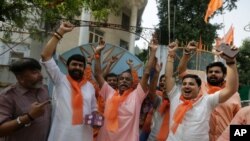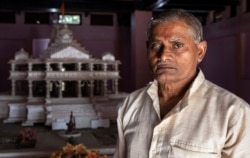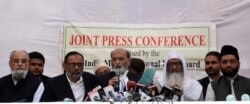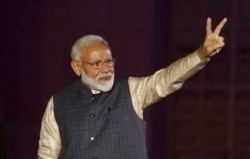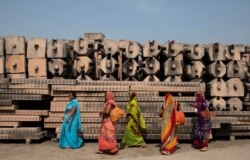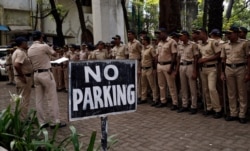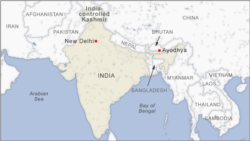India’s Supreme Court Saturday handed a disputed plot to Hindus, paving the way for the construction of a temple in the town of Ayodhya in northern India, where a Hindu mob tore down a 16th century mosque more than 25 years ago.
Ruling unanimously on one of the country’s oldest and most contentious disputes between Hindus and Muslim groups, a five-judge bench ordered that Muslims should be given an alternate plot of land to build a mosque.
The decades-old quarrel over a 2.77-acre strip of land came to a head in 1992, when the mosque’s demolition triggered riots that killed 2,000 people.
The land will be given to a trust to be set up by the government for overseeing the construction of a Hindu temple.
Hindu and Muslim leaders reiterated pleas for peace and harmony after the verdict was announced.
Hindus believe the disputed land is the birthplace of their god Rama and that the mosque was built on the ruins of a Hindu temple.
Zafaryab Jilani, a lawyer for Muslim litigants, said they were not satisfied with the judgment but appealed for peace.
“The land of the mosque has been given to the other side. This is neither equity nor justice,” he said.
Police, troops patrol
Security was tight throughout the country, especially in Ayodhya, which is being patrolled by 5,000 police and paramilitary troops and processions have been banned.
Prime Minister Narendra Modi, who had given calls for restraint, tweeted that the judgment should not be seen as a win or loss for anbody.
“I appeal to my countrymen that everyone’s priority should be that the verdict strengthens the great tradition of peace, unity and good will of India,” he wrote.
"It highlights that any dispute can be amicably solved in the spirit of due process of law. It reaffirms the independence, transparency and farsightedness of our judiciary. It clearly illustrates everybody is equal before the law."
The verdict will be seen as a victory for his Hindu nationalist Bharatiya Janata Party. The populist temple issue has played a key role in catapulting the ruling BJP to national prominence. During this year’s election campaign that brought the party back to power with a bigger mandate, it reiterated pledges to build the temple.
The case landed in the Supreme Court after both Hindu and Muslim litigants challenged a 2010 judgment that had handed two-thirds of the disputed area, including the site where the mosque stood, to Hindus and one-third to the Muslims.
After several efforts at mediation failed, a five-judge bench of the top court concluded hearings last month. Delivering the verdict, the judges said they had decided the dispute on the basis of legal principles, not faith.
Welcoming the verdict, Mohan Bhagwat, the head of the Rashtriya Swayamsevak Sangh, a Hindu nationalist organization that is an ideological force behind BJP, which has pushed for the building of the temple, said the judgment brings an end to a decades-long dispute and the country must move ahead in harmony.
Above all, peace
Anxiety has built up in Ayodhya, where many want to see the temple built, but both Muslim and Hindu residents say that above all they want to see an end to the protracted dispute.
“We want the issue to be resolved once and for all,” Arun Kumar, a Hindu resident said.
“We have full faith that the temple will be built, but more than anything we want peace,” he said.
Preparations for a temple
Life in the pilgrim town has for years revolved around the prospective temple. Its supporters have been painstakingly chiseling huge sandstone stone pillars and models of the temple are ready. Hundreds of Hindu pilgrims pour in to worship in a makeshift tent that serves as a temple, where idols of god Rama have been placed.
Analysts say the temple campaign brought religious identity to the center of Indian politics and the verdict could have far-reaching implications in a country where assertive Hindu nationalism is gaining steam under Modi’s right-wing government.
Hindus make up about 80% of India’s population, Muslims account for 14%.
As the Supreme Court wrapped up hearings last month, Muslim litigants told the court its decision may affect the minds of millions in India, which adopted a secular constitution in 1950.
“It is for the court to consider the consequences of its historic judgment by molding the relief in a fashion that will reflect the constitutional values that this great nation espouses,” they said.
However, the task of balancing the two sides in a case that is a complex mix of faith, sentiment and myth is challenging, according to Sandeep Shastri, pro vice chancellor of Jain University.
Ruing that efforts at an out-of-court settlement failed, he said that “ultimately when a court gives a judgment, it is very difficult to satisfy all parties.”
“So at the end of the day,” he said, “a judgment is very often a zero-sum game. That is my disquiet with critical, emotional issues seeking to be resolved in courts.”




